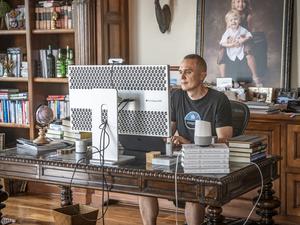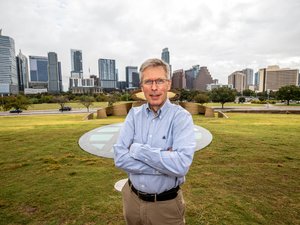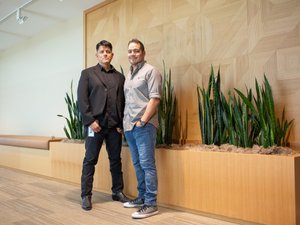David Kil is a man of precision and efficiency. If being the chief data scientist in charge of managing and analyzing highly complex education metrics for Civitas Learning isn't proof enough, consider this: Kil used to run a 10K every day. On the weekends he ran half marathons and marathons.
"I thought that's the way to improve my fitness," he said. "What I realized was that, number one, it was taking up too much of my time and, number two, my body fat wasn't improving."
So he hired a life coach to make better use of his workout time. This was back when Kil was working at a startup in Silicon Valley.
"I wanted to really understand the right work-life balance," Kil said. "I'm all about efficiency. So the question was 'what can I do to work out for the least amount of time and still improve my body composition?'"
Kil's life coach led him to yoga and meditation for relaxation and a series of other aerobic movements. He felt great. But Kil is a data and tech guy who has an iPhone in his pocket and an Apple Watch on his wrist.
He was an early adopter of the Fitbit, but it wasn't providing the data he needed because it only tracked steps -- (worth noting here Fitbit has sold 4.5 million of its devices and brought in a lot more money than Wall Street expected).
"When I do yoga motions I get no credit because all of these (fitness apps) are step-based," he said.
So, he and his wife, Frances Shin, built an app that provides a health score that includes balance, cardio, flexibility and strength. He measures his heart rate, body fat and his mood with a few pinches of his chest, belly and thigh and corresponding taps on his phone. It has a playlist of workouts and GIF demonstrations of each movement.
Kil stands up in conference room at Civitas Learning's offices at Cesar Chavez and Congress to demonstrate, knocking out a quick round of squats. It tracks whether his range of motion and movements were correct.
Kil said the 99 cent app, miboHealth, is only being used by about 100 people.
"It's mostly for research purposes. We haven't thought of marketing it at all," he said. "It was just a personal hobby. If people want to use it, that's great. It's just for fun."
That "fun" led to a 3-year grant from the National Institute of Health grant to work with a hospital chain and university in Oregon. Now, they're investigating how to use social networks to spread good behaviors.
Lessons Learned in the Health Sector Applied to Education
Until 2013, most of Kil's work had been in healthcare. He was chief science officer at Humana, a health insurance company, chief scientist at SKT Americas, a telecom company, and, most recently, chief science officer at HealthCrowd.
Nearly all of his work ties back to predictive analytics. And that has nearly infinite applications in education.
At Civitas, Kil has worked with an ever-growing team of data scientists and education experts to create predictive analytics to help college students find paths where they are most likely to succeed. The company uses anonymous data from the schools to track a wide variety of metrics, from grades and online classroom interaction to real-time test scores and life events, such as spring break and midterm exams.
For example, an A student in high school who has great ACT scores may land a C grade in a midterm exam in their first semester of college and feel shocked by the poor performance.
"In that case, we look for your behaviors," he said. "Do you get angry and work even harder? Or are you so disappointed you go through a sort of depression period. And we try to understand if that's an opportune moment for us to engage the student and give tips to study more effectively."
Knowing that on a mass scale -- paired with many other factors -- helps Civitas identify key moments to intervene with students and which class choices and study habits are most effective in specific scenarios.
Kil talks about Civitas as an "invisible hand" that students may not have to actively think about -- but it is there to help nudge students toward success. Creating that guidance, however, requires a lot of creativity with the varying amounts of data that are available for each student and each college system. Kil said he was surprised to see how much students' digital footprints varied when he first arrived at Civitas.
"I quickly realized that there was no way to take a common approach to building predictive models. I also wanted to maximize the use of available data for every student," he said. "That's how I cane up with a multi-stage hierarchical model building process (patent pending), where we group students based on what data is available (data-availability segmentation). For each data-availability segment, we then cluster similar students using the best predictors for the segment. Finally we identify top predictors for each segment-cluster and then build a model. This allows us to provide the best possible actionable insights personalized to each student."
Civitas Learning's products also help schools track which professor activities are working best and which types of classes are likely to help students complete college on time.
For example, their data analysis can track how much students are cramming before an exam based on how active they are in online classroom chats and how many lectures they watch online.
If students who are cramming do poorly, Civitas or the school can suggest nudging students a couple weeks before the test and show how much more likely they are to do well on the test if they start studying earlier. And he believes that these data-backed best practices can help students be more successful.
But even Kil admits that data has limits.
"We can do all of these things," he said. "We can build the best models, the most insightful algorithms. But, in the end, if you don't act on those insights, there's no use."







